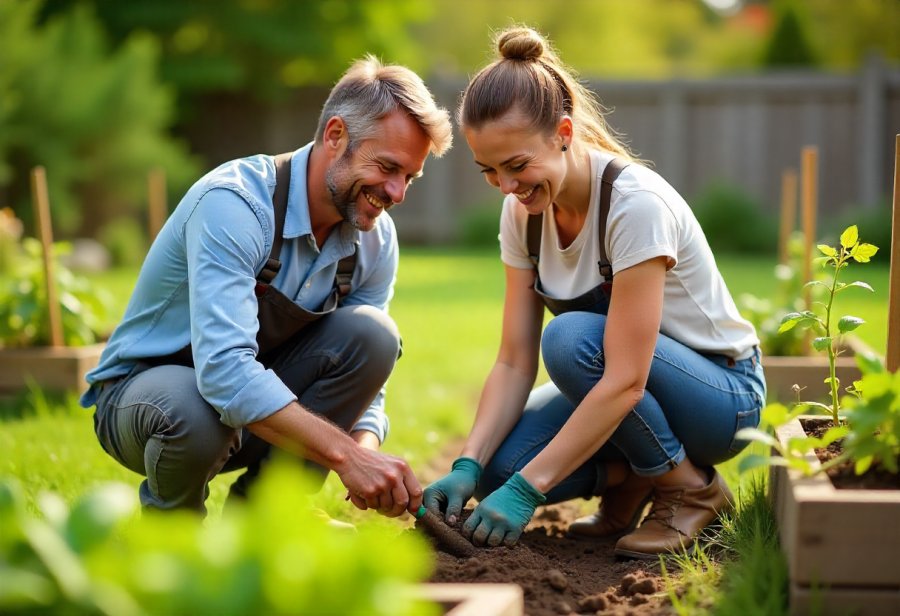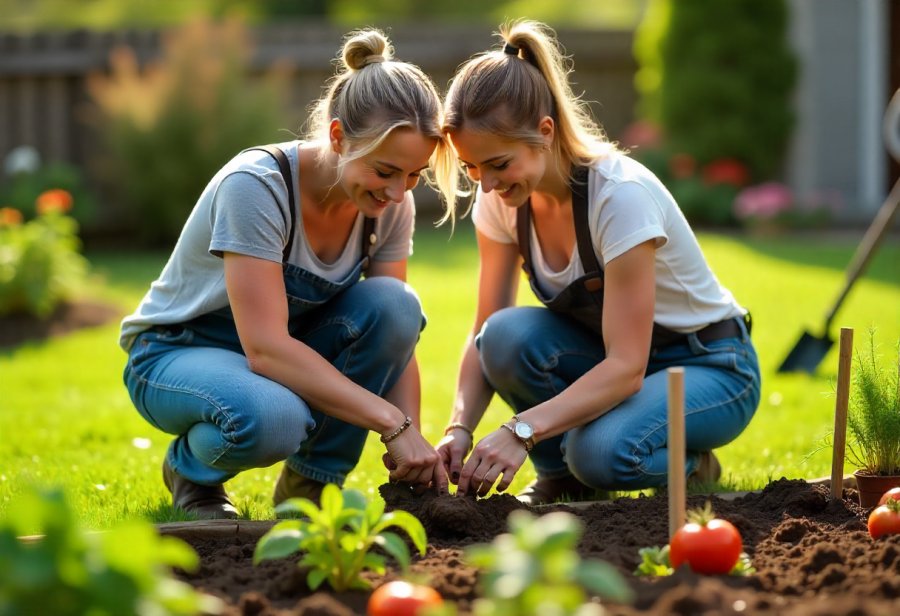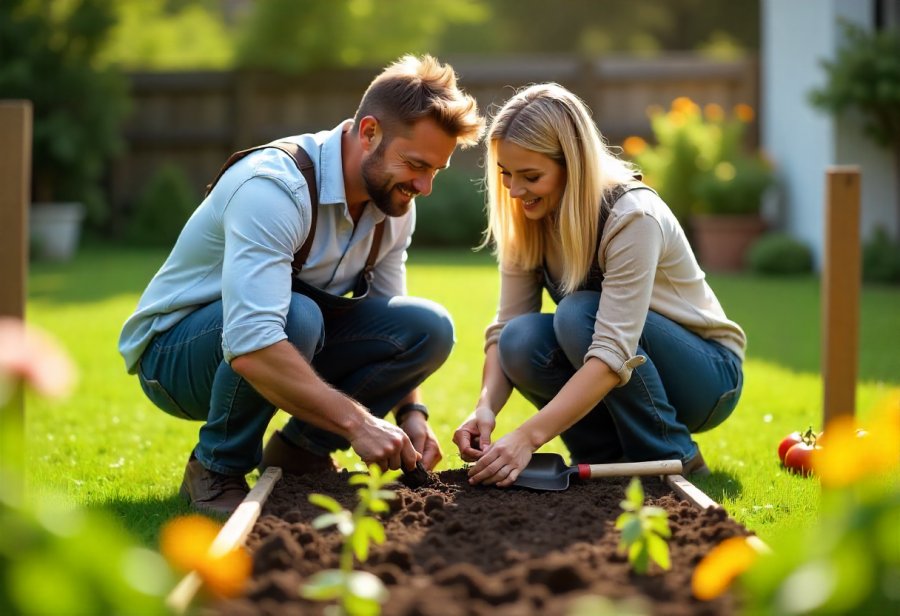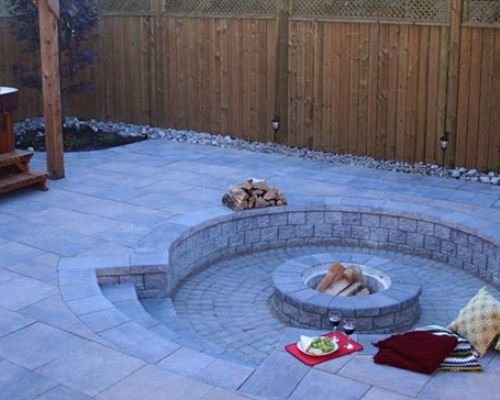In our fast-paced, digital world, can tending to a garden together unlock deeper emotional bonds and foster healing? This heartfelt exploration reveals how shared gardening activities—planting, nurturing, and witnessing growth—are more than mere hobbies; they are powerful rituals of patience, trust, and connection. Rooted in history and backed by modern therapy, gardening offers a tangible, calming refuge that encourages honest communication and mutual support. By engaging in simple, routine acts like watering and planting, couples and families can rebuild trust and deepen bonds in ways words often cannot. The act of cultivating life side by side becomes a metaphor for nurturing relationships, reminding us that growth takes time and care. As we learn to overcome setbacks together, gardening transforms from a pastime into a meaningful journey of resilience, love, and shared achievement—proving that sometimes, the most profound connections are rooted in the soil.

Reconnect and Heal Through the Simple Act of Gardening
In today’s fast-paced, digitally connected world, it’s easy to feel like genuine human connection is slipping away. We spend hours scrolling through social media feeds, replying to messages, or binge-watching shows, often at the expense of real, face-to-face interactions. Despite the convenience of technology, many of us crave opportunities to reconnect on a more meaningful level. Gardening offers a simple, tangible way to bridge that gap, reminding us of the power of nature and shared effort to foster bonds.
Tending a garden together isn’t just about plants; it’s about creating a space where patience, cooperation, and communication can flourish. As you dig, plant, water, and nurture, you’re engaging in an activity that naturally encourages dialogue and mutual support. This shared effort can help rebuild trust and deepen emotional ties in ways that words sometimes can’t. It’s a quiet, calming process that invites mindfulness and presence—an antidote to the chaos of modern life.
Throughout history, gardening has played a role in strengthening communities and relationships. From ancient times to today, collective planting and harvesting have been ways to bring people together, share responsibilities, and pass down traditions. These activities foster a sense of belonging and pride, illustrating that connection often grows alongside the act of caring for living things. Today, that same principle applies, but with a modern twist: using outdoor space and nature as a backdrop for emotional healing and relationship building.
Gardening also offers a therapeutic escape, helping to reduce stress and promote mental well-being. Engaging with soil and plants encourages mindfulness, patience, and gentle reflection—qualities that can translate into stronger, more resilient relationships. As you watch your shared efforts sprout and flourish, you’re reminded that growth, both in a garden and in a bond, takes time and care.
Looking ahead, it’s clear that this activity can serve as a bridge to reconnect in a meaningful way. Whether it’s a small balcony herb garden or a larger backyard project, planting and tending together creates routines that foster trust and open communication. In a world where digital interactions often feel superficial, gardening provides a space for honest connection, shared achievement, and healing—reminding us that sometimes, the simplest acts are the most powerful.
Roots of Connection: The Historical and Cultural Significance of Gardening
Gardening’s roots stretch deep into human history, serving as much more than a practical activity. From ancient civilizations, communal gardens weren’t just about growing food—they were vital social spaces where people gathered, worked side-by-side, and built lasting bonds through shared effort. These early gardens fostered cooperation, trust, and a sense of community, turning tending soil into a collective act of resilience. Over time, the activity evolved into a symbol of patience and nurturing that transcended mere survival, becoming a powerful tool for social connection.
Different cultures have long used gardening as a way to strengthen relationships. In many societies, collective planting and harvest events became central to community life, creating opportunities for neighbors to collaborate and pass down traditions. These shared responsibilities fostered pride and belonging, anchoring social ties in the act of caring for living things. Gardening, therefore, became more than a routine—it was a way to weave resilience and emotional bonds into everyday life.
Conceptually, gardening has always been linked to healing and reflection. Working with nature encourages mindfulness and patience, providing a calming escape from daily stresses. This connection between caring for plants and emotional well-being has been recognized for centuries. Modern research supports the idea that soil and plant care can reduce anxiety, lower stress hormones, and boost mood. The act of nurturing growth becomes a metaphor for emotional healing, emphasizing that patience and care are essential for both plants and relationships.
In recent decades, the understanding of gardening as a therapeutic activity has grown. Today, we see therapeutic gardens in hospitals and community centers designed to promote mental health. These spaces are crafted to create calming environments where individuals can reflect, find peace, and connect with others. The structured yet natural rhythm of planting and tending cultivates cooperation, communication, and trust—all vital ingredients for emotional resilience. Gardening’s ability to facilitate shared effort makes it a naturally effective way to nurture bonds.
This conceptual foundation highlights that gardening’s role in connection and healing isn’t new; it’s woven into the fabric of human culture. Its evolution reflects our deep-seated need to nurture, cooperate, and find peace through shared labor. Recognizing these roots inspires us to see gardening not just as a pastime, but as a meaningful act that can strengthen bonds, foster resilience, and support emotional well-being. It’s a timeless activity that reminds us growth—both in nature and in relationships—requires patience, effort, and care.

Modern Perspectives: Gardening as a Path to Emotional Well-Being
In recent years, perceptions of gardening have shifted from simple outdoor chores to a meaningful approach for boosting mental health and fostering emotional bonds. Today, many see it as a calming, hands-on activity that helps quiet the mind and reduce stress. The rhythmic tasks of planting, watering, and tending serve as natural mindfulness practices, encouraging presence and patience amid today’s busy, often chaotic lives.
Experts increasingly recognize gardening as a form of therapy. The shared responsibility of caring for plants creates opportunities for trust and open communication. When working together in the garden, people naturally support each other, deepening bonds through mutual effort and shared purpose. These moments of cooperation often turn into meaningful experiences that words alone can’t replicate, making gardening a powerful tool for emotional connection.
Media plays a big role in shaping how we view gardening now. Documentaries, social media stories, and articles highlight personal journeys of healing and peace found through tending plants. These narratives reinforce that gardening is accessible and beneficial, offering a refuge from anxiety and sadness. Seeing images of lush gardens or community plots inspires many to explore gardening as a way to find calm and connection.
While some skeptics question the extent of gardening’s mental health benefits, the overall consensus remains positive. Studies show that engaging with nature releases endorphins, lowers cortisol levels, and boosts mood. The physical activity involved also offers gentle exercise that can improve overall well-being. For many, gardening becomes a sustainable part of self-care routines, providing ongoing emotional support.
Community projects underscore this shift in perception. Urban gardens, therapeutic spaces, and workplace green areas demonstrate how accessible gardening is as a tool for mental and social health. These initiatives showcase how even small outdoor activities can create meaningful opportunities for connection, resilience, and shared achievement in everyday life.
This evolving view highlights that gardening isn’t just a hobby—it’s a way to nurture mental resilience and emotional well-being. Its simple acts foster patience, cooperation, and trust, which are essential for building stronger relationships. As more people embrace gardening for its healing qualities, it’s clear that tending plants offers more than growth in soil; it cultivates growth within us as well.
Modern perspectives also emphasize that gardening can be a bridge back to nature and each other, especially in a digital age where superficial interactions dominate. The tactile, grounding experience of caring for plants encourages mindfulness and genuine presence. This connection to the natural world reminds us that healing and bonding often begin with simple, shared acts of care.
Ultimately, the current outlook on gardening affirms its timeless power: nurturing both plants and people. By cultivating a garden, we nurture trust, patience, and emotional resilience—values that help relationships flourish. As awareness grows, gardening continues to prove its worth as a natural, accessible pathway to emotional well-being and deeper human connection.
For those interested in exploring how gardening can enhance emotional health, numerous resources and communities now advocate for its benefits. Learning more about the ways gardening supports mental well-being can inspire even greater engagement. You can discover more about the positive impacts of gardening on mental health by visiting this comprehensive guide on gardening and mental health.
Getting Started: Practical Steps to Make Gardening a Bonding Ritual
Getting started with gardening as a bonding activity doesn’t need to be complicated or intimidating. Focus on simplicity and enjoyment: choose easy-to-grow plants like herbs, lettuce, or colorful flowers that don’t require much fuss. These options are perfect for beginners and can deliver quick wins that keep motivation high. Find a small space, whether it’s a balcony, backyard corner, or community garden plot, to keep the project manageable and inviting.
Creating a routine is key. Setting aside regular time—be it weekends or after dinner—turns gardening into a shared activity rather than a chore. Consistency helps build teamwork and anticipation, making the process feel natural and rewarding. Keep the atmosphere relaxed; it’s more about savoring the moment than perfect results. Focus on planting, watering, and caring for your plants, and let go of immediate expectations.
Support each other through early successes, like planting seedlings or seeing the first sprouts. Celebrate these small wins together, and encourage open dialogue about what’s working or what challenges you face. Sharing observations and asking questions fosters patience and mutual understanding, laying the groundwork for deeper connection. Remember, gardening is a gradual process—each small step adds up to bigger growth.
Involve your partner or loved ones in decisions about what to plant and how to arrange the space. This collaborative approach sparks conversation and shared responsibility, strengthening your bond. Simple tasks, like passing tools or exchanging compliments, can deepen feelings of teamwork and companionship. Making decisions together turns gardening into a meaningful shared journey.
Flexibility is just as important as routine. If plants don’t sprout or pests appear, see these setbacks as part of the process. Approach challenges with humor and patience, viewing them as opportunities to learn and grow together. Overcoming obstacles side-by-side can turn frustrations into moments of bonding, reinforcing resilience and shared effort.
Leverage resources like beginner gardening guides, online tutorials, or local gardening clubs to keep the experience engaging. Keeping a simple journal to track your planting schedule and note what works helps maintain motivation and provides a sense of progress. Participating in community workshops can also add support and inspiration, making gardening a sustainable, enriching routine.
By taking these practical steps, gardening transforms from a hobby into a bonding ritual. The act of planting, nurturing, and watching your shared efforts flourish creates trust and patience. It’s a gentle way to nurture not just plants, but also your relationship. Over time, these routines and shared experiences weave a stronger, more resilient connection rooted in care, cooperation, and growth.

Nurturing Growth: Embrace Gardening to Strengthen Relationships and Discover Lasting Connection
Tending a garden together is about more than just watching plants grow; it’s a quiet act of building trust and fostering connection through shared effort. When you work side by side, planting, watering, and caring for life, you create a space where patience and cooperation naturally flourish. These small, consistent acts serve as a foundation for deeper bonds, reminding us that relationships, like gardens, need ongoing nurturing to thrive.
Gardening offers a gentle pathway to emotional healing, especially in today’s busy, digital world. It encourages mindfulness and presence, giving space for honest conversations or peaceful shared moments. These experiences, rooted in caring for something living, cultivate a sense of achievement and intimacy that words alone often can’t reach. Watching your garden flourish under joint effort becomes a metaphor for growth in your relationship—gradual, steady, and deeply rewarding.
As you look forward, consider gardening as an ongoing act of care that can extend beyond individual moments. Whether it’s a small balcony herb garden or a backyard project, each task you share builds routines that strengthen your bond over time. These routines become rituals—watering together, planting seeds, tending to blooms—that reinforce trust and cooperation in a natural, effortless way.
Challenges will come, as they do in any relationship or garden. Pests, plants that don’t sprout, or weather setbacks are opportunities to practice patience and humor. Overcoming these hurdles side by side deepens resilience and reinforces your shared commitment. Each obstacle becomes a lesson in perseverance, reminding you that growth often requires time, effort, and a little adaptability.
The benefits of gardening reach beyond the soil. It’s a way to cultivate vulnerability, trust, and mutual support—values that help relationships flourish long-term. Each seed planted and each bloom nurtured is a symbol of ongoing growth, rooted in love and patience. Making gardening a regular part of your life creates a space for healing and connection that can sustain your bonds through life’s seasons.
In a world that often emphasizes superficial interactions, gardening offers a tangible, grounding activity rooted in real presence. It encourages us to slow down, pay attention, and connect authentically with each other and nature. These quiet moments of shared effort remind us that healing and relationship-building often start with simple acts of care.
Embracing gardening as a part of your relationship journey can transform how you communicate, support, and grow together. It’s an act of love that requires patience and consistency but rewards you with a deeper understanding and trust. As your garden flourishes, so too will your bond—steadily and beautifully—nurtured by shared purpose and gentle care.










